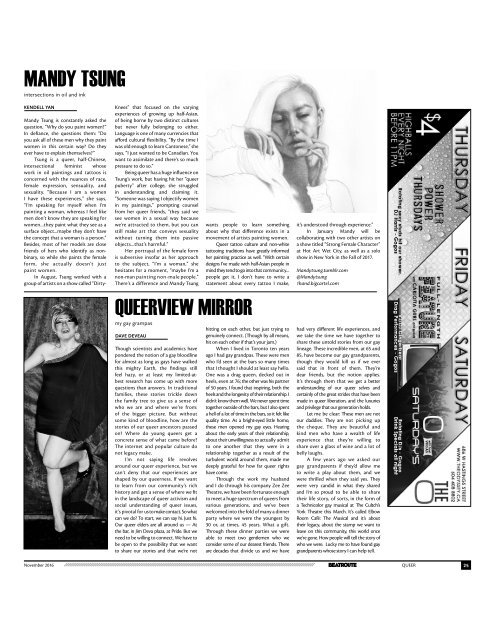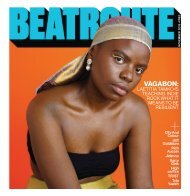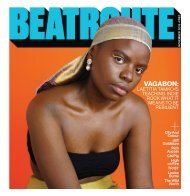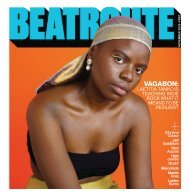BeatRoute Magazine B.C. print e-edition - November 2016
BeatRoute Magazine is a monthly arts and entertainment paper with a predominant focus on music – local, independent or otherwise. The paper started in June 2004 and continues to provide a healthy dose of perversity while exercising rock ‘n’ roll ethics.
BeatRoute Magazine is a monthly arts and entertainment paper with a predominant focus on music – local, independent or otherwise. The paper started in June 2004 and continues to provide a healthy dose of perversity while exercising rock ‘n’ roll ethics.
Create successful ePaper yourself
Turn your PDF publications into a flip-book with our unique Google optimized e-Paper software.
Mandy TSUnG<br />
intersections in oil and ink<br />
KENDELL YAN<br />
Mandy Tsung is constantly asked the<br />
question, “Why do you paint women?”<br />
In defiance, she questions them: “Do<br />
you ask all of these men why they paint<br />
women in this certain way? Do they<br />
ever have to explain themselves?”<br />
Tsung is a queer, half-Chinese,<br />
intersectional feminist whose<br />
work in oil paintings and tattoos is<br />
concerned with the nuances of race,<br />
female expression, sensuality, and<br />
sexuality. “Because I am a women<br />
I have these experiences,” she says,<br />
“I’m speaking for myself when I’m<br />
painting a woman, whereas I feel like<br />
men don’t know they are speaking for<br />
women...they paint what they see as a<br />
surface object...maybe they don’t have<br />
the concept that a woman is a person.”<br />
Besides, most of her models are close<br />
friends of hers who identify as nonbinary,<br />
so while she paints the female<br />
form, she actually doesn’t just<br />
paint women.<br />
In August, Tsung worked with a<br />
group of artists on a show called “Dirty-<br />
Knees” that focused on the varying<br />
experiences of growing up half-Asian,<br />
of being borne by two distinct cultures<br />
but never fully belonging to either.<br />
Language is one of many currencies that<br />
afford cultural flexibility. “By the time I<br />
was old enough to learn Cantonese,” she<br />
says, “I just wanted to be Canadian. You<br />
want to assimilate and there’s so much<br />
pressure to do so.”<br />
Being queer has a huge influence on<br />
Tsung’s work, but having hit her “queer<br />
puberty” after college, she struggled<br />
in understanding and claiming it.<br />
“Someone was saying I objectify women<br />
in my paintings,” prompting counsel<br />
from her queer friends, “they said we<br />
see women in a sexual way because<br />
we’re attracted to them, but you can<br />
still make art that conveys sexuality<br />
without turning them into passive<br />
objects...that’s harmful.”<br />
Her portrayal of the female form<br />
is subversive insofar as her approach<br />
to the subject, “I’m a woman,” she<br />
hesitates for a moment, “maybe I’m a<br />
non-man painting non-male people.”<br />
There’s a difference and Mandy Tsung<br />
QUeeRvieW MiRRoR<br />
my gay grampas<br />
DAVE DEVEAU<br />
Though scientists and academics have<br />
pondered the notion of a gay bloodline<br />
for almost as long as gays have walked<br />
this mighty Earth, the findings still<br />
feel hazy, or at least my limited-atbest<br />
research has come up with more<br />
questions than answers. In traditional<br />
families, these stories trickle down<br />
the family tree to give us a sense of<br />
who we are and where we’re from:<br />
of the bigger picture. But without<br />
some kind of bloodline, how are the<br />
stories of our queer ancestors passed<br />
on? Where do young queers get a<br />
concrete sense of what came before?<br />
The internet and popular culture do<br />
not legacy make.<br />
I’m not saying life revolves<br />
around our queer experience, but we<br />
can’t deny that our experiences are<br />
shaped by our queerness. If we want<br />
to learn from our community’s rich<br />
history and get a sense of where we fit<br />
in the landscape of queer activism and<br />
social understanding of queer issues,<br />
it’s pivotal for us to make contact. So what<br />
can we do? To start, we can say hi. Just hi.<br />
Our queer elders are all around us — At<br />
the bar, in Jim Deva plaza, at Pride. But we<br />
need to be willing to connect. We have to<br />
be open to the possibility that we want<br />
to share our stories and that we’re not<br />
wants people to learn something<br />
about why that difference exists in a<br />
movement of artists painting women.<br />
Queer tattoo culture and non-white<br />
tattooing traditions have greatly informed<br />
her painting practice as well. “With certain<br />
designs I’ve made with half-Asian people in<br />
mind they tend to go into that community...<br />
people get it, I don’t have to write a<br />
statement about every tattoo I make,<br />
hitting on each other, but just trying to<br />
genuinely connect. (Though by all means,<br />
hit on each other if that’s your jam.)<br />
When I lived in Toronto ten years<br />
ago I had gay grandpas. These were men<br />
who I’d seen at the bars so many times<br />
that I thought I should at least say hello.<br />
One was a drag queen, decked out in<br />
heels, even at 76; the other was his partner<br />
of 50 years. I found that inspiring, both the<br />
heels and the longevity of their relationship. I<br />
didn’t know them well. We never spent time<br />
together outside of the bars, but I also spent<br />
a hell of a lot of time in the bars, so it felt like<br />
quality time. As a bright-eyed little homo,<br />
these men opened my gay eyes. Hearing<br />
about the early years of their relationship,<br />
about their unwillingness to actually admit<br />
to one another that they were in a<br />
relationship together as a result of the<br />
turbulent world around them, made me<br />
deeply grateful for how far queer rights<br />
have come.<br />
Through the work my husband<br />
and I do through his company Zee Zee<br />
Theatre, we have been fortunate enough<br />
to meet a huge spectrum of queers from<br />
various generations, and we’ve been<br />
welcomed into the fold of many a dinner<br />
party where we were the youngest by<br />
30 or, at times, 45 years. What a gift.<br />
Through these dinner parties we were<br />
able to meet two gentlemen who we<br />
consider some of our dearest friends. There<br />
are decades that divide us and we have<br />
it’s understood through experience.”<br />
In January Mandy will be<br />
collaborating with two other artists on<br />
a show titled “Strong Female Character”<br />
at Hot Art Wet City, as well as a solo<br />
show in New York in the Fall of 2017.<br />
Mandytsung.tumblr.com<br />
@Mandytsung<br />
1hand.bigcartel.com<br />
had very different life experiences, and<br />
we take the time we have together to<br />
share these untold stories from our gay<br />
lineage. These incredible men, at 65 and<br />
85, have become our gay grandparents,<br />
though they would kill us if we ever<br />
said that in front of them. They’re<br />
dear friends, but the notion applies.<br />
It’s through them that we get a better<br />
understanding of our queer selves and<br />
certainly of the great strides that have been<br />
made in queer liberation, and the luxuries<br />
and privilege that our generation holds.<br />
Let me be clear: These men are not<br />
our daddies. They are not picking up<br />
the cheque. They are beautiful and<br />
kind men who have a wealth of life<br />
experience that they’re willing to<br />
share over a glass of wine and a lot of<br />
belly laughs.<br />
A few years ago we asked our<br />
gay grandparents if they’d allow me<br />
to write a play about them, and we<br />
were thrilled when they said yes. They<br />
were very candid in what they shared<br />
and I’m so proud to be able to share<br />
their life story, of sorts, in the form of<br />
a Technicolor gay musical at The Cultch’s<br />
York Theatre this March. It’s called Elbow<br />
Room Café: The Musical and it’s about<br />
their legacy, about the stamp we want to<br />
leave on this community, this world once<br />
we’re gone. How people will tell the story of<br />
who we were. Lucky me to have found gay<br />
grandparents whose story I can help tell.<br />
<strong>November</strong> <strong>2016</strong> QUEER<br />
25


















